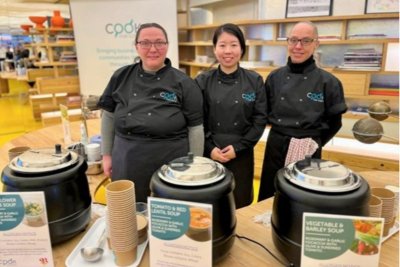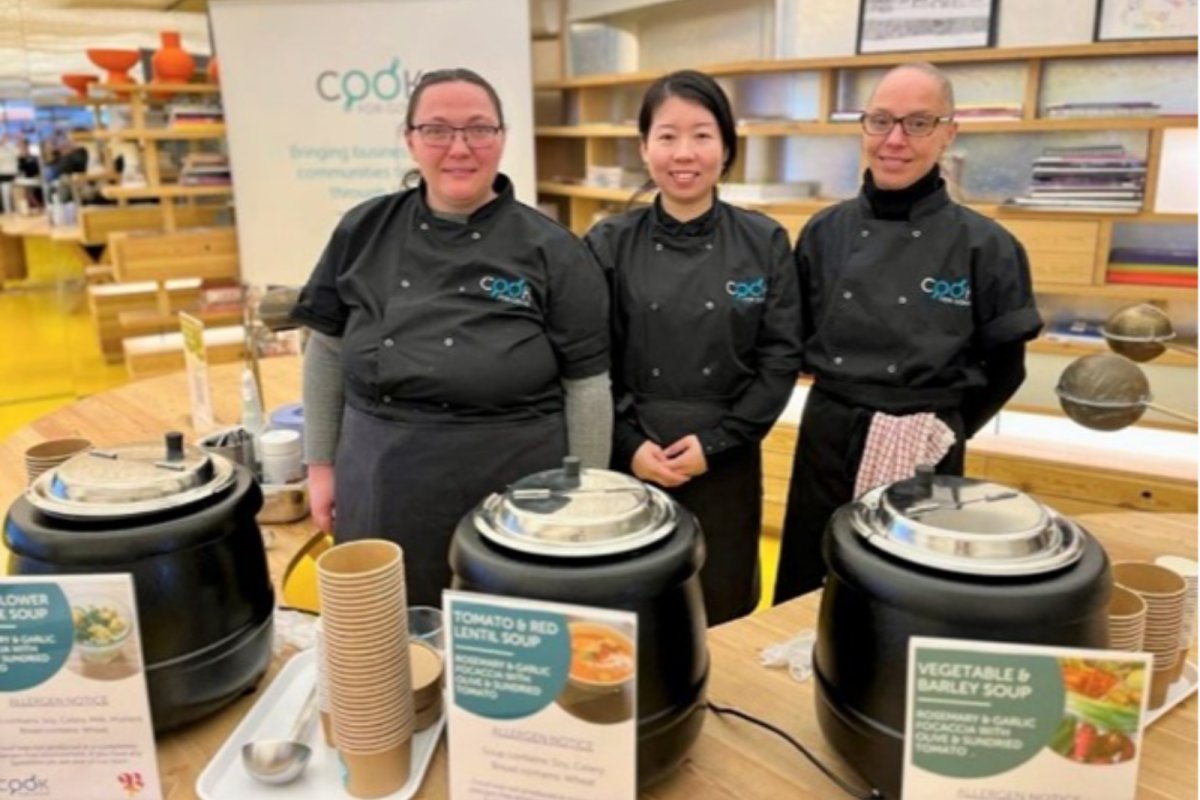 Cook for good chefs with freshly made soup.. Credit: Cook for Good
Cook for good chefs with freshly made soup.. Credit: Cook for Good
A Q&A with Karen Mattison, co-founder of Cook for Good
Who are Cook for Good?
Cook for Good are an award-winning social business that brings businesses and communities together through food and cooking. We’re tackling food insecurity, social isolation and health inequality in and around the Priory Green housing estate in Kings Cross, supported by corporate clients and partnerships. We run a surplus food pantry, a soup café, community cooking classes and meals, and we provide programmes to support health and wellbeing and create employment opportunities.
Since launching in 2019 we now serve approximately 350 households through our weekly pantry, support 50 people to access volunteering, training and employment each year, and distribute around 8500 meals to local residents each year.
As we move into our third year of fully operating our model in Priory Green, we are ready to tell the story of what we did and how we did it. It is important to us as a social venture to share our learning and help replicate similar models to we can drive greater social change at scale.
What is your business model?
Cook for Good is a social enterprise, set up as a Community Interest Company (CIC). The project is run by twelve full and part time staff and around 25 active volunteers who are all local residents.
The vision came from a combination of myself and my co-founder Robinne’s experience. Hers in running corporate cooking events and mine in launching and growing social enterprises. The community programme and pantry is largely funded by the revenue from corporate teambuilding events that we run in our kitchen, as well as bespoke partnerships with a network of corporate social partners.
Our team building events see teams coming to the kitchen to prep, cook and package nutritious meals which are then distributed to local residents through the pantry, community meals or via local shelters and food banks. In the last few years we have worked with over 70 corporate clients many of whom come back for seconds!
How did your partnership start?
Peabody has worked with Cook for Good from the start. We were looking for a community site to establish our social enterprise. Peabody had unused space – two buildings that housed an old laundry and where they had trialled a café. They were open to trialling a more innovative model through our community kitchen and adapting the old laundry into a surplus food pantry, and committed to offer Cook for Good a rent free and utility free lease of the spaces for 10 years.
Why choose a social enterprise and how did you get it going?
We have been struck by the growing need from communities for access to affordable food, due to the cost-of-living crisis. And also the importance of offering support to address the root causes of this through reducing social isolation and health inequality and providing support on income maximisation or access to employment.
But we also saw the strain many community projects and food banks are under with diminishing funding, and largely volunteer led teams, that makes it hard to run let alone develop and grow. We wanted to create a model where we were able to generate our own revenue, using our community kitchen to serve corporate teams as well as our community. It was also really important to us that the residents of Priory Green could trust us to be around for a while. I had run another successful social enterprise before, so this felt like absolutely the right approach.
Once we had established a partnership with Peabody, we secured support from corporate firms in Kings Cross, including Meta, Ninja and TP Bennet, to refurbish the two community spaces. All this work was provided on a pro bono basis.
We then secured social investment from People’s Postcode Lottery. This enabled us to hire a small staff team to launch our community programme and pantry and market our events to corporate teams. We were then able to slowly build up a strong client base over our first year of operating.
What advice would you give to other housing associations looking to support new social enterprises tackling food insecurity?
Many housing associations, and local authorities, have developed community food initiatives for their residents to help tackle food insecurity and also the root causes. It’s important to ensure sustainable solutions that don’t rely on recurrent (and decreasing) grant funding, so social enterprise models are appealing. But to help establish viable ventures, there are a number of key things to consider:
- Assess the viability. Is a social enterprise model the right approach based on your locality? Is there a viable market either of consumers or business clients? Consider ways you could work together to explore this e.g. through a mini feasibility study.
- Enterprise start up. As well as offering a lease (ideally peppercorn for a fixed period) on underused space, also consider what start up support you could provide or broker to community projects. Peabody supported us with some initial grant funding to help with fit out. Are there networking events or business forums, meet the supplier events or other advisory agencies you can leverage to help the organisation develop a business plan? There are often opportunities to access support from Housing Associations social value commitments within their supply chain.
- Sharing risk. Are you open to offering social investment or sharing the risk with some startup funding too? It can take several years for a social enterprise to move into profit, as they are balancing both financial return and social impact. Also be prepared to innovate and pivot. Peabody were initially looking for a café model but were open to adjusting to support our community kitchen and team building idea.
- Partnership leads. Capacity within housing associations can be very stretched but allocating someone to work closely with your community organisation will be invaluable for both sides, to build trust, connections and streamline the startup process wherever possible. Not all community organisations are risk ready, so some form of advisory support or mentoring is really helpful.
- Access to trade. Consider ways you can promote your partnership and the organisation whether its opportunities to trade at events or with partners, sight of and access to procurement opportunities.
And to community organisations looking to partner with a housing association to establish a place-based social enterprise?
- Do your research. If you want to generate your own revenue – whether through a community café, kitchen, or shop – go and meet others doing it first. Most organisations are happy to share.
- Assess your market and community needs. Talk to the community you are looking to serve. Get their input early on as this builds trust and buy in. If you are looking to offer a paid for service or membership model, also stress test what revenue you can realistically generate. Housing associations know their residents well and can advise and potentially support you to do some market research or linked resident outreach organisations.
- Find an advocate. When looking to partner with a housing association find an internal champion who will help you to navigate through the various teams you will need to deal with from property and estate to access to wider business support. We were able to do this with Peabody – and they recognised the value of providing a senior champion for us in order to ensure wider organisational buy in for our shared aims.
- Involve the community as much as possible, so they feel that they are part of the venture. For example, we don’t offer volunteering opportunities to corporates, but instead recruit community members to take part in a volunteer programme which is giving them valuable work experience and skills.
- Be prepared to constantly innovate and diversify. At Cook for Good our core revenue is generated from our corporate team building events, but we are also developing other initiatives such as a recipe book and a soup service enterprise.
- Make it simple to ‘buy social’. Have a good quality product that people want, whether you are trading with consumers or businesses. It’s not enough that it’s for a good cause, you have to be competitive too, both on product and pricing. But also make it really clear where the profits go, as it can help you access new channels and markets especially with businesses who are more and more conscious of both CSR and ESG partnerships.
- And finally....be resilient! It can take time to establish a social enterprise. Its hugely rewarding but lots of hard work too. Surround yourself with smart people, a good team with a mix of social and commercial skills and great partners.
Now that Cook for Good has established our model and moving into our third year of trading, we are working with Peabody to explore how to catalyse more partnerships between housing associations and community food projects. Our goal is to incubate and support more sustainable holistic solutions to tackling food insecurity. If you are interested to find out more please contact Emma.stewart@cookforgood.uk development associate or Andrea.Purslow@peabody.org.uk, Head of Strategic Partnerships and Funding.
Good Food Enterprise: Working to provide food that is good for people and the planet, and support local production playing a part in community beyond trading.
Sustain
The Green House
244-254 Cambridge Heath Road
London E2 9DA
020 3559 6777
sustain@sustainweb.org
Sustain advocates food and agriculture policies and practices that enhance the health and welfare of people and animals, improve the working and living environment, promote equity and enrich society and culture.
© Sustain 2024
Registered charity (no. 1018643)
Data privacy & cookies
